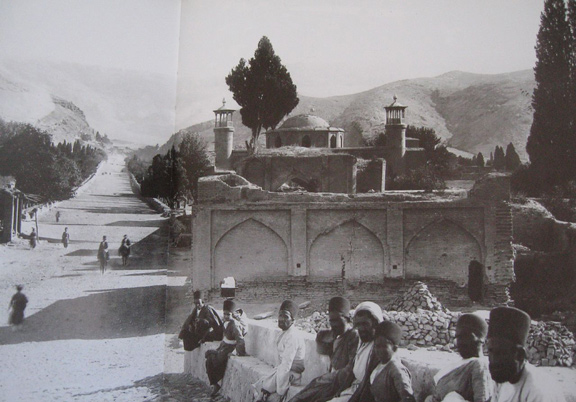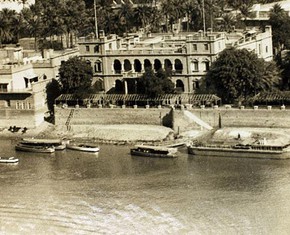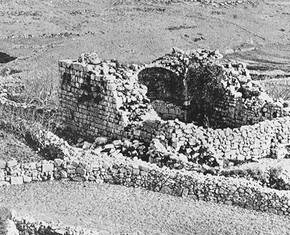The views expressed in our content reflect individual perspectives and do not represent the authoritative views of the Baha'i Faith.
Though the ocean of woe rageth on every side, and the bolts of fate follow in quick succession, and the darkness of griefs and afflictions invade soul and body, yet in My heart brightened by the remembrance of Thy countenance and My soul is as a rosegarden from the perfume of Thy nature. – The Bab, quoted by Abdu’l-Baha, A Traveller’s Narrative, pp. 13-14.
The ministry of the Bab lasted for six years. After his pilgrimage the Bab remained in Shiraz until 1846. Upon hearing reports about the Bab, the shah dispatched a leading Islamic clergyman to investigate the new religion on his behalf.
This individual, known to history as Vahid, succeeded in meeting the Bab. He soon became a believer and reported to the shah accordingly, requesting that an interview be arranged between the Bab and the shah. But no meeting with the shah ever occurred. Vahid would later die for his beliefs.
 In 1846 the Bab was expelled from his native city of Shiraz by the governor, who was angered by the tumult the Bab had raised. The Bab went from there to the city of Isfahan, where he gained the allegiance of many citizens, thereby incurring the opposition of most of the clergy. The clamor stirred up by the latter group became so great that the Bab’s life was threatened. The governor of this city, however, became very attached to the Bab and secretly became a believer. The governor was so powerful that nobody dared to harm the Bab while he was under his protection. The governor eventually conceived a scheme whereby the Bab would attain an audience with the shah, and he personally vowed to devote all of his wealth and resources to the advancement of the new religion.
In 1846 the Bab was expelled from his native city of Shiraz by the governor, who was angered by the tumult the Bab had raised. The Bab went from there to the city of Isfahan, where he gained the allegiance of many citizens, thereby incurring the opposition of most of the clergy. The clamor stirred up by the latter group became so great that the Bab’s life was threatened. The governor of this city, however, became very attached to the Bab and secretly became a believer. The governor was so powerful that nobody dared to harm the Bab while he was under his protection. The governor eventually conceived a scheme whereby the Bab would attain an audience with the shah, and he personally vowed to devote all of his wealth and resources to the advancement of the new religion.
The Bab thanked the governor for this offer but then predicted that his days on earth would end very soon. He assured the governor that God would reward his intentions but that the Bab’s own destiny was to suffer martyrdom. Within a very short time the governor passed away after a sudden illness.
Before his death, the governor had made preparations for the Bab to be escorted to Tehran to meet the shah. The Bab set out on this journey under armed escort. But this attempt to have the Bab meet the shah also failed. The prime minister, deeply afraid that the Bab would convince the shah of the truth of the new religion, managed to convince the sovereign to postpone the interview. Instead of going to Tehran, the Bab was sent to the northwestern province of Azerbaijan, where he was incarcerated in a fortress known as Mah-Ku. In this way the prime minister averted what to him was a serious threat to his own power. He believed that, had the sovereign accepted the new religion, it would have meant the end of his own influence.
Meanwhile, news of the newly born faith spread to every corner of the country and into the neighboring Ottoman domains. News accounts even appeared in the journals of Europe and North America. As time passed, the Bab revealed a constant stream of sacred scripture.
His main theme was anticipation of “Him Whom God shall make manifest.” But the Bab also revealed new laws and teachings designed to make a deliberate break with Islam and establish the new faith as an independent religion. His specific teachings addressed, among other things, the high station of women, the need for social and political reform, and the anticipation of a new era in human history that would witness the establishment of universal justice and brotherhood.
He also abrogated many Islamic laws, calling openly for the clergy and citizenry to submit to his authority as a Messenger of God. In such ways the Bab sought to prepare His followers and His countrymen for the new age that was now dawning.
The Bab’s extraordinary claim, complemented by a revolutionary break with past traditions, was welcomed by those who saw the need for sweeping social and religious change, and who also recognized the Bab as One sent by God to establish righteousness. To this was added the Bab’s astonishing boldness combined with an almost irresistible personal magnetism. As the Bab made his way towards Azerbaijan from city to city, and later while under strict confinement, tales began to spread of his charming personality, his courage, and his phenomenal knowledge. People who had seen and met the Bab related overwhelming spiritual experiences. There were also stories of miraculous cures and other supernatural feats. The time came when he could not enter a city without being mobbed by citizens eager to gaze upon him. Some went so far as to carry away the water that he used to wash himself before prayers, believing that it contained special powers.
















Comments
Sign in or create an account
Continue with Googleor